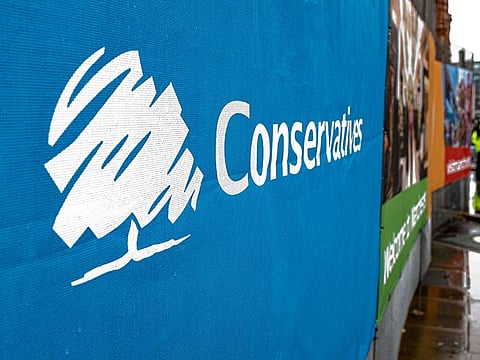UK Conservatives head right for the exit
After suffering major losses in local elections, Tories are doubling down on nativism

After 13 years governing the United Kingdom, the Conservative Party is bracing for eviction from office. Last week, it was pummeled in local elections across England, losing more than 1,050 council seats and securing a pitiful 26 per cent of the popular vote.
Though such contests are an imperfect guide to a party’s likely performance in a general election, these calamitous results suggest the Conservatives are heading for the exit.
The general election must be held by Jan. 28, 2025, at the latest and will almost certainly take place next year.
Prime Minister Rishi Sunak has little choice but to stick to the strategy he adopted on taking the top job in October: stabilising the economy, with an ugly side order of culture wars, focused on stopping the “small boats” that carry desperate refugees across the English Channel and deporting to Rwanda those who make it.
Also Read: Are the UK Tories playing out the clock?
You might expect, though, that, within the broader party and associated think tanks, this would be a time of re-evaluation and energetic thinking to address the many pressing questions facing the Conservatives in 21st-century Britain.
What hope can the party offer younger voters, who bitterly resent Brexit, the shortage of affordable housing and government inaction on climate change? What is the modern Conservative answer to the changing needs of Britain’s public services — especially its woeful system of social care for the elderly?
How, after the terrible premierships of Boris Johnson and Liz Truss, can the Conservatives rebuild public trust and lay claim to competence and compassion?
These are the kind of questions you might quite reasonably expect the Conservative Party to be asking itself. But you would be wrong. Instead, the movement is doubling down on the right-wing populism and nativism that have been its twin engines since the Brexit referendum of 2016.
UK variant of Trumpism
Increasingly, the critical mass of British Conservatism is to be found not in an openness to the changing world but in a UK variant of Trumpism.
Witness the “National Conservatism” conference that is being held in London between May 15 and 17, under the auspices of the Edmund Burke Foundation.
Its stated objective is to rally the troops of the right behind “the revival of the unique national traditions that alone have the power to bind a people together and bring about their flourishing.”
The most striking feature of the conference is the seniority of its speakers, including Home Secretary Suella Braverman; Michael Gove, the cleverest minister of Sunak’s government; and Jacob Rees-Mogg, until recently an influential cabinet minister who now has his own show on the channel GB News.
They will be joined by American allies such as Ohio Sen. J.D. Vance, the commentator Rod Dreher, the Hudson Institute’s Christopher Demuth and Kevin Roberts of the Heritage Foundation.
This is emphatically not a fringe festival of maverick Conservatives. It is a strategic gathering of the dominant ideologues within the party, designed to reinforce their grip on its imagination and future and strengthen the bond with their counterparts across the Atlantic.
This is the UK chapter of the MAGA movement, and it is fizzing with confidence: ferociously opposed to “wokery,” to immigration and to the so-called liberal elites.
One Nation tradition
No less conspicuous is the absence of a rival alliance of Conservative moderates. Until recently, the centrist “One Nation” tradition within the party remained a powerful force, representing those Tories who believed in the obligations of the rich to the poor, in decent public services and in internationalism.
When Conservatives took power 13 years ago with David Cameron, he became prime minister by promising a modern version of the party that was socially liberal, committed to environmental protection and proudly determined to spend more on the National Health Service and international development.
That version of the Conservative Party has simply ceased to exist. Its morale was destroyed by Brexit and its ranks in Parliament depleted by Johnson’s ruthless purges in 2019. For the first time in my lifetime, moderate Conservatism has no clearly identifiable leader-in-waiting or tribune.
The closest candidate for such a role would be Penny Mordaunt, a Brexiteer who nonetheless has many modern instincts. But she has twice run without success for the party leadership and has no identifiable caucus of followers in Parliament.
Instead, the gravitational pull of nationalist populism is proving irresistible to a growing number of Conservatives. Genuine conviction — a belief in the United Kingdom and its traditions — is being weaponised by the more dangerous slogans and hashtags of xenophobia, resentment and social conservatism.
Is this what the country needs in its presently state? Absolutely not. But be in no doubt — it is what the Conservative Party is planning to offer.
Washington Post
Matthew d’Ancona is editor at large at the New European and a columnist at the London Evening Standard.


